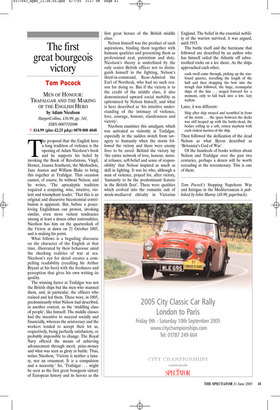The first great bourgeois victory
Tom Pocock
MEN OF HONOUR: TRAFALGAR AND THE MAKING OF THE ENGLISH HERO by Adam Nicolson HarperCollins, £16.99, pp. 341, ISBN 0007192096 ✆ £14.99 (plus £2.25 p&p) 0870 800 4848 The proposal that the English have a long tradition of violence is the opening of Adam Nicolson’s book and he supports his belief by invoking the Book of Revelations, Virgil, Homer, Joanna Southcott, the Methodists, Jane Austen and William Blake to bring this together at Trafalgar. That occasion cannot, of course, be without Nelson, and he writes, ‘The apocalyptic tradition required a conjuring, wise, intuitive, violent and triumphant leader.’ That this is an original and discursive bicentennial contribution is apparent. But, before a peaceloving Englishman can protest, invoking similar, even more violent tendencies among at least a dozen other nationalities, Nicolson has him on the quarterdeck of the Victory at dawn on 21 October 1805, and is making his point.
What follows is a beguiling discourse on the character of the English at that time, illustrated by their behaviour amid the shocking realities of war at sea. Nicolson’s eye for detail creates a compelling readability (recalling Sir Arthur Bryant at his best) with the freshness and perception that gives his own writing its quality.
The winning factor at Trafalgar was not the British ships but the men who manned them, and, in particular, the officers who trained and led them. These were, in 1805, predominantly what Nelson had described, in another context, as the ‘middling class of people’, like himself. The middle classes had the incentive to succeed socially and financially, whereas the aristocracy and the workers tended to accept their lot as, respectively, being perfectly satisfactory, or probably impossible to change. The Royal Navy offered the means of achieving advancement through merit, prize-money and what was seen as glory in battle. Thus, writes Nicolson, ‘Victory is neither a luxury, nor an ornament. It is a compulsion and a necessity.’ So, ‘Trafalgar ... might be seen as the first great bourgeois victory of European history and its heroes as the first great heroes of the British middle class.’ Nelson himself was the product of such aspirations, binding them together with humane qualities and presenting them as professional zeal, patriotism and duty. Nicolson’s theory is underlined by the only senior British officer not to distinguish himself in the fighting, Nelson’s third-in-command, Rear-Admiral the Earl of Northesk, who had no such reason for doing so. But if the victory is to the credit of the middle class, it also demonstrated upward social mobility as epitomised by Nelson himself, and what is here described as ‘his intuitive understanding of the intimacy of violence, love, courage, honour, classlessness and victory’.
Nicolson examines this amalgam, which was activated so violently at Trafalgar, especially in the sudden switch from savagery to humanity when the storm followed the victory and there were enemy lives to be saved. Behind the victory lay ‘the entire network of love, honour, mutual reliance, self-belief and sense of responsibility’ that Nelson inspired as much as skill in fighting. It was he who, although a man of violence, prayed for, after victory, ‘humanity to be the predominant feature in the British fleet’. These were qualities which evolved into the romantic cult of mock-mediaeval chivalry in Victorian England. The belief in the essential nobility of the warrior survived, it was argued, until 1915.
The battle itself and the hurricane that followed are described by an author who has himself sailed the Atlantic off sabretoothed rocks on a lee shore. As the ships approached each other,
each swell came through, picking up the starboard quarter, travelling the length of the hull and then dropping the bow into the trough that followed, the huge, rectangular ships of the line ... surged forward for a moment, only to fall back into a low, lazy wallow.
Later, it was different:
Ship after ship swayed and trembled in front of the storm ... the space between the decks was still heaped up with the battle-dead, the bodies rolling in a soft, rotten mayhem with each violent motion of the ship.
Then followed the deification of the dead Nelson as what Byron described as ‘Britannia’s God of War’.
Of the hundreds of books written about Nelson and Trafalgar over the past two centuries, perhaps a dozen will be worth rereading at the tercentenary. This is one of them.


















































 Previous page
Previous page